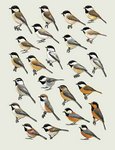
Basically every corner on the surface of Earth that has been destabilized by human activity. Carbon, nitrogen, and phosphorus are being released at insane rates, leading to chaos in the oceans (algal blooms and anoxia). On land our usage of vast areas have turned regions into ecological deserts. Less and less room is left for nature, and we risk destroying the very systems we depend on. We are mammals at the end of the day, mammals evolved to survive in an interglacial period. We will not be able to handle a hothouse Earth.
As far as I am concerned, all literature and art made now has to on some level address the Anthropocene. We live on the edge of a cliff and we as a species seem to have chosen to jump off.
I was cleaning trash today. While trying to unstick plastic bottles and dog doo bags from the soil I kept being reminded of how cooked we are. Very glad to have been born when I did. Very few seem to want to talk about it in an earnest way.
The massive loss of life, environment, ecosystems, etc, does depress me, but I have some conflict about how to address it. I unarguably agree that human created causes (whether directly or indirectly) are leading the charge in warming the climate and imbalancing the natural world. However, human interventions have generally been failures when it comes to addressing environmentalism, except in the case of complete abstinence.
For example, the American model of addressing wildfires. Wildfires are a natural and inherent part of the forestry in northern America. We know this because some trees involve fire in their reproductive cycle. However, our first foray into addressing wildfire was to stop it completely. It's fire, and we do not control it, so it's bad.
Over time, we then realized we were actually stopping a crucial part of the forestry's natural way of being (for lack of better term). Without normal fires, the fuel load builds up in the forest and then, when fires do occur, supposedly they are bigger and hotter and larger.
This brings us to the current model, where we have been trying to rehash the "prescriptive burn" for decades. That is, if we create small fires, we can mitigate the chances of big fires. Great. Except that it is still not working.
Some notable wildfires in New Mexico and California have shown that people are not great at controlling fires. Prescriptive burns escape, and forests want to burn. And people living in these habitats do not want fires near them. Fingers are pointed at the agencies running the burn programs, but I wager that fire, on an ecological scale, is probably inherently unmanageable. We aren't talking campfires here. We, nortern Americans, live in places that should burn. But we don't want our houses and things to burn down, obviously that's bad.
So, the contradiction between what humans want (a predictable and safe environment) and what nature wants (change, cyclical action, emergence) appears. Anyway, I wrote all this because sometimes I think that nature itself is quite volatile and we are the ones who demand it be predictable.
I also lament the loss of biodiversity, and that is probably one of the current largest losses in the environment. We probably won't appreciate that until too late, as humans are determined to monoculture the world. Again, perhaps, a tendency of predictability.
No other life forms know they are alive, and neither do they know they will die. This is our curse alone. Without this hex upon our heads, we would never have withdrawn as far as we have from the natural—so far and for such a time that it is a relief to say what we have been trying with our all not to say: We have long since been denizens of the natural world. Everywhere around us are natural habitats, but within us is the shiver of startling and dreadful things. Simply put: We are not from here. If we vanished tomorrow, no organism on this planet would miss us. Nothing in nature needs us.
Anons, which ecological writers do you think are worth reading? Both for reading about the environment and the ways to protect it in the contemporary era. I've read the Sand County Almanac by Aldo Leopold, and liked it, although his political position of land must be protected through federal means seems dated now.
I read Uncle Vanya last night and was struck by Astrov's monologue in the middle of Act 3 that touched on this existential resignation:
Look there! That is a map of our country as it was fifty years ago. The green tints, both dark and light, represent forests. Half the map, as you see, is covered with it. Where the green is striped with red the forests were inhabited by elk and wild goats. Here on this lake, lived great flocks of swans and geese and ducks; as the old men say, there was a power of birds of every kind. Now they have vanished like a cloud. Beside the hamlets and villages, you see, I have dotted down here and there the various settlements, farms, hermit's caves, and water-mills. This country carried a great many cattle and horses, as you can see by the quantity of blue paint. For instance, see how thickly it lies in this part; there were great herds of them here, an average of three horses to every house. [A pause] Now, look lower down. This is the country as it was twenty-five years ago. Only a third of the map is green now with forests. There are no goats left and no elk. The blue paint is lighter, and so on, and so on. Now we come to the third part; our country as it appears to-day. We still see spots of green, but not much. The elk, the swans, the black-cock have disappeared. It is, on the whole, the picture of a regular and slow decline which it will evidently only take about ten or fifteen more years to complete. You may perhaps object that it is the march of progress, that the old order must give place to the new, and you might be right if roads had been run through these ruined woods, or if factories and schools had taken their place. The people then would have become better educated and healthier and richer, but as it is, we have nothing of the sort. We have the same swamps and mosquitoes; the same disease and want; the typhoid, the diphtheria, the burning villages. We are confronted by the degradation of our country, brought on by the fierce struggle for existence of the human race. It is the consequence of the ignorance and unconsciousness of starving, shivering, sick humanity that, to save its children, instinctively snatches at everything that can warm it and still its hunger. So it destroys everything it can lay its hands on, without a thought for the morrow. And almost everything has gone, and nothing has been created to take its place. [Coldly] But I see by your face that I am not interesting you.
Well Linkola was had some very insane ideas I agree with you completely the biggest flaw of all the “animals all do good humans all do bad” philosophy is that it doesn’t take into account that humans are just as much a part of nature and earth’s ecosystem as all other animals and that our traits are just as much as ours as of every other species. Does that excuse a lot of our behaviour? Not really, but you gotta contextualice it.
I think it's a good thing that *some* things are coming to a close; the dinosaurs "died out" and now we have chickens.
I think and hope it will be this way for those who deserve it.

Unless someone like you cares a whole awful lot,
Nothing is going to get better. It's not.
man exists to change his surroundings to his own ends, not to grasp for straws in some specific environment. stop worshipping nature, bugs dirt and grass, and instead have faith in the spirit of man to, when the time comes, strongarm the world into obedience. the earth will not become uninhabitable.
You know what forget I said anything, I didn't need to be mean about it.
I simply do not see why you want to disregard the immense complexity of the natural world, pollute it, and put all prescriptive weight into the ability of man to create. Obviously man creates and has changed his environment to his own ends. If you love all of life, why would you denigrate everything else but what is man's? I won't even touch the assertion that the world was created for us, because it doesn't matter. And I do not think that people should "lie down and die" for nature. But it is funny (or sad) that the idea that one should attempt to consume or destroy less that one thinks it is an attempt to end humanity.
Ecclesiastes is an ironic place to quote, I think, because it can be boiled down to "less is more," at the risk of hyperbole. I do not think happiness is compatible with hubris, profligacy.
>one should attempt to consume or destroy less is equated with an attempt to end humanity.

I've been thinking about this recently and I think one of the main reasons environmentalism (as in any idea remotely close to trying to effectuate some change, not blatant greenwashing and adjacent policies) has been failing on its face is because of is that they strike the sort of golden mean. Groups like last generation hyperfocus on one facet of the issue (global warming and more specifically transportation and commute's impact), largely ignore equally important sides like unresolvable issue of waste management, tremendous and irrevocable loss of biodiversity and mass extinctions, harm of monoculture farming, pesticides and soil degradation, light and noise pollution, health effects of pollution and so forth. And while they put magnifying glass up to society's face for it to focus on that specific aspect, they manage to do it in most antagonizing way while neither really describing the issue properly nor proposing any sort of real solution. Even if you're conscious of the issue it's really hard to root for these people whenever they put another clownshow. I'm aware that you can't really get anywhere with this cause without aggravating society massively, but it feels like that sort of activism is too much and not enough at the same time.
But I also can't really say I know what the solution is. Many will point to issue being capitalism, and while it is partially true, I can't really say economy based on central planning would really amend the grand issue, even if we ignore multiple ecological disasters Soviet Union and China wrought in the past and present. At the scale we are operating, with over 8 billion people on the planet (though this number is projected to start shrinking within generation or two) industrial, globalized society in general is going to be inherently destructive. And any utopian ideas that think this can be resolved without "going back" like solarpunk are not just unfeasible, they are generally batshit insane.
La grandajn problemojn de l’homa vivado
“malsato, sekeco kaj poluado”
rapide, nun solvos, scienco kaj teknologio.
Ĉu “kial ni vivas kaj kial ni mortos”
la nuntempa filozofio eksplikos,
ĉu la homoj plu ne bezonos la helpon de Dio?